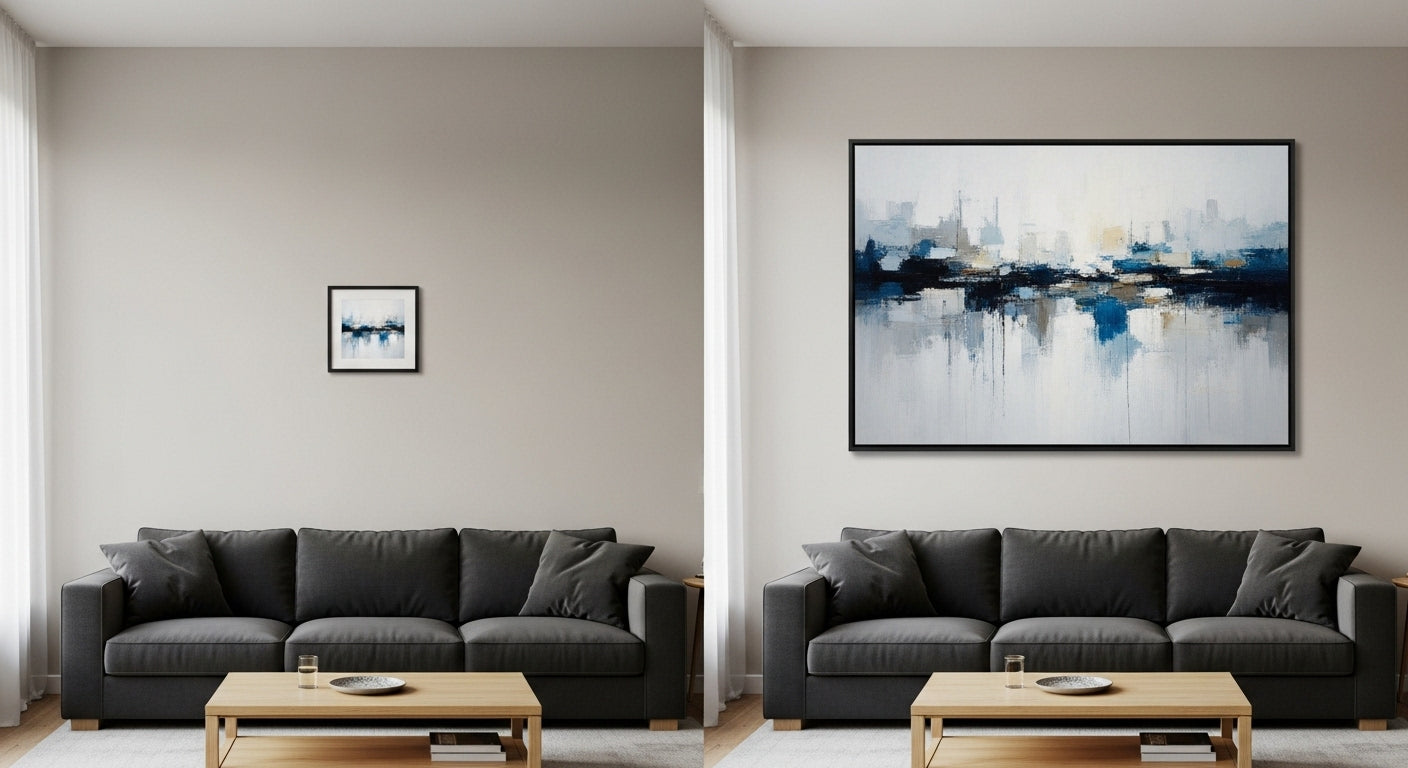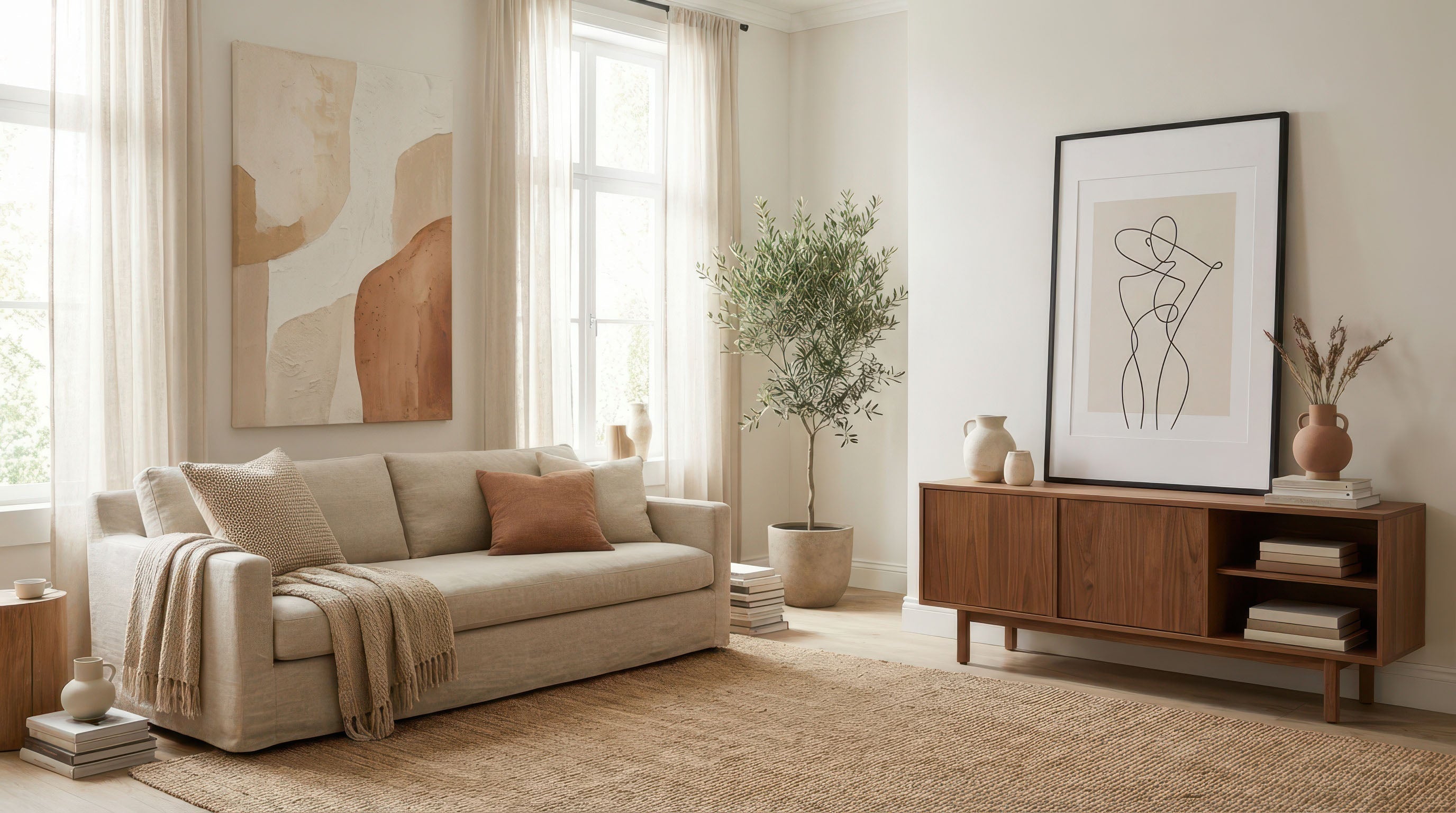Artículo: The Complete Guide to Choosing the Right Wall Art Size for Every Room

The Complete Guide to Choosing the Right Wall Art Size for Every Room
Nothing transforms a room quite like the perfect piece of wall art. But here's the thing – even the most stunning artwork can look out of place if it's the wrong size. Too small, and it gets lost on your wall. Too large, and it overwhelms the space. Finding that "just right" size is an art in itself.
After helping thousands of customers find their perfect pieces, we've compiled this comprehensive guide to take the guesswork out of sizing wall art for any room in your home.
The Golden Rules of Wall Art Sizing
Before diving into room-specific advice, let's establish some universal principles that professional interior designers swear by:
The 2/3 to 3/4 Rule
Your artwork should take up approximately 2/3 to 3/4 of the available wall space. For example, if you have 6 feet of open wall space, your art (or art grouping) should span 4 to 4.5 feet.
The Eye-Level Rule
The center of your artwork should hang at approximately 57-60 inches from the floor. This is the average eye level and creates the most comfortable viewing experience. In rooms where you're typically seated (dining rooms, bedrooms), you can adjust slightly lower.
The Furniture Relationship Rule
When hanging art above furniture, the piece should be about 2/3 to 3/4 the width of the furniture below it. Leave 6-8 inches between the top of the furniture and the bottom of the frame.
Living Room: Making a Statement
The living room is where you can be boldest with your art choices. It's typically the largest room and the social heart of your home.
Above the Sofa
- For a standard 84" sofa: Choose artwork 56-63 inches wide
- Single large piece: 30x40" to 36x48" canvas works beautifully
- Gallery grouping: Combine 2-3 medium pieces (20x30" or 24x32")
- Vertical space: Leave 6-8 inches between sofa back and art bottom
Feature Wall
- Solo statement piece: Go big with 40x60" or larger
- Triptych arrangement: Three 20x30" pieces with 2-3 inches spacing
- Salon wall: Mix 5-9 pieces of varying sizes, keeping 2-3 inches between each
Above Console or Mantel
- Width: Aim for 50-75% of the console/mantel width
- Height consideration: In rooms with high ceilings, you can layer two pieces vertically
- Recommended sizes: 24x36" to 30x40" for standard mantels
Pro Tip: In open-concept living spaces, your art helps define zones. Use larger pieces to anchor seating areas and create visual boundaries.
Bedroom: Creating Your Sanctuary
Bedroom art should complement the restful atmosphere while still making a design statement.
Above the Headboard
- King bed (76" wide): 40x60" single piece or two 30x40" pieces
- Queen bed (60" wide): 36x48" single piece or two 24x32" pieces
- Full/Double (54" wide): 30x40" single piece or two 20x30" pieces
- Vertical clearance: Leave 8-10 inches above the headboard
Opposite the Bed
This wall catches your eye when you wake up, making it perfect for inspiring or calming artwork.
- Dresser wall: Match artwork width to 2/3 of dresser width
- Empty wall: Create a focal point with a 36x48" or larger piece
- Narrow walls: Vertical orientations (24x36" or 20x30") work best
Side Walls
- Nightstand art: Small pieces (16x20" or 18x24") create symmetry
- Reading nook: Medium piece (24x32") at seated eye level
Dining Room: Setting the Scene
Dining room art should enhance conversation and appetite while complementing your dining furniture.
The Dining Wall Formula
- Horizontal arrangement: Art width should be 50-75% of table length
- For 6-person table (72" long): 36-54 inches of art width
- For 8-person table (96" long): 48-72 inches of art width
Buffet or Sideboard Styling
- Single piece: Choose art 2/3 the width of the furniture
- Pair arrangement: Two pieces, each 1/3 the furniture width
- Mixed grouping: Combine different sizes maintaining overall proportion
Height Consideration: In dining rooms, hang art slightly lower (center at 54-56") since viewers are seated.
Kitchen: Adding Personality
Kitchens often have limited wall space, but the right art can transform the cooking experience.
Small Wall Spaces
- Between cabinets: 12x16" to 16x20" pieces fit perfectly
- Above window: Horizontal pieces 20x30" or smaller
- Breakfast nook: 24x32" to 30x40" depending on table size
Open Wall Strategies
- Gallery shelf: Multiple small pieces (8x10" to 11x14") on floating shelves
- Statement piece: One 24x36" or larger above a kitchen cart or bench
Hallway: Creating Flow
Hallways are perfect for telling a visual story through art.
Narrow Hallways (less than 48" wide)
- Single file: 16x20" to 20x30" pieces spaced 4-6 feet apart
- Gallery style: Mix 8x10" and 11x14" pieces at varying heights
Wide Hallways (more than 48" wide)
- Larger statements: 24x36" to 30x40" pieces work well
- Paired arrangements: Two medium pieces side by side
Stairway Walls
- Stepped arrangement: Follow the angle of the stairs
- Size progression: Start with larger pieces (24x36") at bottom, smaller (16x20") at top
- Consistent spacing: Maintain 3-4 inches between pieces
Home Office: Inspiring Productivity
Your workspace art should motivate without distracting.
Behind the Desk
- Video call consideration: Art visible on camera should be 24x36" to 36x48"
- Centered placement: Align with your seated position
- Multiple pieces: Create a grid with 4-6 smaller pieces (12x16" or 16x20")
Side Walls
- Inspiration board: Mix sizes from 8x10" to 20x30"
- Single focus piece: 30x40" at seated eye level
Bathroom: Unexpected Elegance
Don't overlook the bathroom – art here adds unexpected sophistication.
Powder Room
- Above toilet: 16x20" to 24x32" depending on wall width
- Vanity wall: Match 50-60% of vanity width
- Small accent: 8x10" or 11x14" on narrow walls
Quick Reference Size Chart
| Room | Wall Location | Recommended Sizes |
|---|---|---|
| Living Room | Above Sofa | 30x40" to 36x48" |
| Living Room | Feature Wall | 40x60" or larger |
| Bedroom | Above Queen Bed | 36x48" or two 24x32" |
| Bedroom | Above King Bed | 40x60" or two 30x40" |
| Dining | Dining Wall | 36x48" to 40x60" |
| Kitchen | Small Walls | 12x16" to 20x30" |
| Hallway | Gallery Wall | Mix of 8x10" to 20x30" |
| Office | Behind Desk | 24x36" to 36x48" |
| Bathroom | Powder Room | 16x20" to 24x32" |
Special Considerations
Ceiling Height
- 8-foot ceilings: Standard sizing rules apply
- 9-10 foot ceilings: Add 10-20% to recommended sizes
- Cathedral ceilings: Go bold with oversized pieces or vertical arrangements
Room Proportions
- Square rooms: Symmetrical arrangements work best
- Long, narrow rooms: Multiple pieces spaced evenly
- Open concept: Larger pieces to define spaces
Existing Decor
- Minimalist spaces: One large statement piece
- Busy patterns: Simpler, larger art to avoid visual chaos
- Neutral palettes: Any size works, focus on proportion
The Visualization Test
Before committing to a size, try this simple visualization technique:
- Cut paper templates in your potential art sizes
- Tape them to the wall where you plan to hang art
- Live with them for 24-48 hours
- View from different angles and distances
- Adjust as needed before ordering
Common Sizing Mistakes to Avoid
❌ Going too small – The #1 mistake. When in doubt, size up. ❌ Hanging too high – Remember the 57-60" center rule ❌ Ignoring furniture relationships – Art should converse with furniture, not fight it ❌ One tiny piece on a large wall – Either go bigger or create a grouping ❌ Matching art size to furniture exactly – The 2/3 rule creates better visual balance
When to Break the Rules
Sometimes, breaking conventional sizing rules creates stunning results:
- Oversized art in small spaces can make rooms feel larger
- Tiny art grids (20+ pieces) create texture and interest
- Floor-to-ceiling pieces in narrow spaces add drama
- Asymmetrical arrangements add contemporary flair
Making Your Final Decision
When you've narrowed down your size options, ask yourself:
- Does it complement the furniture scale?
- Does it fill the wall space appropriately?
- Can it be appreciated from the room's main viewing points?
- Does it maintain visual balance with other room elements?
- Does it achieve your desired impact (subtle accent vs. bold statement)?
Ready to Find Your Perfect Piece?
Now that you're armed with professional sizing knowledge, you're ready to choose artwork that will transform your space. Remember, these guidelines are starting points – your personal style and space quirks might call for adjustments.
Pro Tip: If you're still unsure about sizing, our customer service team can provide personalized recommendations based on photos of your space. We've helped thousands of customers find their perfect fit, and we'd love to help you too.
Whether you're drawn to serene landscapes, bold abstracts, or nature photography, the right size will ensure your chosen piece makes exactly the impact you're envisioning. Start with one room, apply these principles, and watch how perfectly sized art transforms your entire home.

